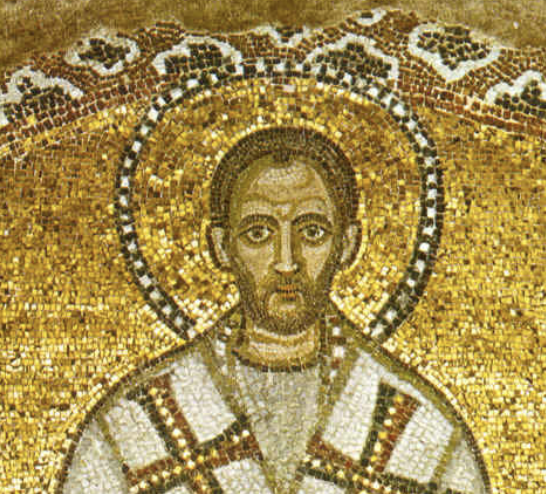Saints Saint John Chrystostome
Saint John Chrysostom was a Bishop of Constantinople and one of the most important early Church Fathers. Born in Antioch, Syria, he was well-educated and fluent in Greek, which was the dominant language of the Eastern Roman Empire. After a brief career as a lawyer, he was ordained a priest and became known for his powerful preaching.

Saint John Chrysostom, whose name means "Golden-Mouthed," was a remarkable theologian, preacher, and Archbishop of Constantinople in the 4th century AD. He is celebrated for his profound understanding of the Scriptures and his ability to translate complex theological ideas into practical guidance for everyday Christian living.
John was born in Antioch, Syria, in the year 349 AD into a well-to-do Christian family. After the early death of his father, his mother, Anthusa, devoted herself to raising John and his sister in the Christian faith. He received an exceptional education, studying rhetoric under the famous pagan teacher Libanius.
John began his career as a lawyer, but feeling a deeper calling, he retreated to the Syrian mountains to live as a hermit for several years. His ascetic life was so severe that it affected his health. Realizing that he couldn't continue living this way, he returned to Antioch where he was ordained a deacon in 381 and a priest in 386.
During his time in Antioch, John Chrysostom gained a reputation as a gifted preacher. His homilies were characterized by their deep understanding of the Scripture and their practical application to Christian life. His eloquence and clarity earned him the epithet Chrysostomos, or "Golden-Mouthed."
In 397 AD, John was appointed as Archbishop of Constantinople, the capital of the Eastern Roman Empire. In this role, he implemented significant ecclesiastical reforms aimed at eradicating corruption and abuses among the clergy and the faithful. His demand for moral integrity and his criticism of excess wealth and opulence were met with resistance, especially from the Empress Eudoxia, whom he rebuked publicly for her extravagant lifestyle and influence in ecclesiastical affairs.
Due to these confrontations, John was exiled on several occasions. His final exile, to the remote region of Pontus on the Black Sea, was particularly harsh and resulted in his death. As he was being transported to this remote location, under unbearable conditions, John died in 407 AD, uttering the last words, "Glory be to God for all things."
Despite the controversies during his lifetime, John Chrysostom’s contributions to the Christian Church were immense. He left a vast collection of writings, including more than 700 homilies, commentaries on nearly every book of the New Testament, and treatises on the priesthood and the Christian life. His Liturgy of St. John Chrysostom is one of the Church's most widely used liturgical forms.
In recognition of his contributions to the Church, John Chrysostom was declared a Doctor of the Church by Pope Innocent III in 1204. His eloquence, wisdom, and dedication to the Christian faith continue to inspire and guide Christians around the world.
Today, we celebrate his feast day on September 13. Saint John Chrysostom stands as a beacon of Christian truth and righteousness, reminding us of the transformative power of God's word and the call to live our faith in daily life.
Learn more about The Saints.